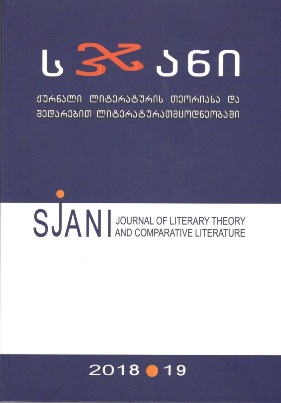“Everything had language”:
Vazha-Pshavela’s “Snake Eater” from the Perspective of Animal Studies
“Everything had language”:
Vazha-Pshavela’s “Snake Eater” from the Perspective of Animal Studies
Author(s): Hayate SotomeSubject(s): Language and Literature Studies
Published by: ლიტერატურის ინსტიტუტის გამომცემლობა
Keywords: Animal studies; Vazha-Pshavela; "Snake Eater".
Summary/Abstract: The philosophy that Nature speaks in “Snake Eater”is based on an epistemology different from the anthropocentlistic-logocentric epistemologyof European phylosophy; the epistemology, the basis of which is the animistic viewof Nature, which we can see in Georgian mythology and folklore,is alsoindicatedin theworldview of the Garden of Eden in Genesis where, before the fall, humans and Naturelive in harmony.From this point, we can say that Mindia’s story is an adventure of goingback to the fall (and falling again). Vazha-Pshavela sets the scene in the Middle Ages onthe basis of the legend “Khogais Mindi” and tries to show in the poem that the plants andNature not only cry and protest as a “reaction” to preserve themselves against the requestfrom humans, but also sacrifice themselves as a “response” on their own responsibility, asestablished by the coexsitence of the mythic-animistic and Christian worldviews...
Journal: სჯანი
- Issue Year: 2018
- Issue No: 19
- Page Range: 186-206
- Page Count: 20
- Language: English

